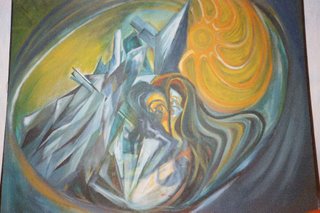
Dreams are symbols.
Our dreams contain messages from our subconsious.
There is great healing in the telling of the dream and in the writing of the dream.
Yesterday I listened to Gunilla Bergerham talking about her experience of working with dreams as a DreamCoach. http://www.gunillabergerham.se/ .
Everything that we experience in our inner and outer worlds is significant and the two worlds are related.
Montague Ullman does Experiential Dream Group Work
"My point is not that dream work will save the world
but that dreams can be a reminder that it needs saving"
Papers:
http://www.siivola.org/monte/papers_grouped/index.htm
Basic Dream Work - An objective comparison of Dream Groups & Therapy (1990)
" am often asked about the difference between the way I work with a dream in an experiential dream group and the way a therapist works with a dream in group or individual therapy. I refer to what I do as Basic Dream Work to contrast it with formal therapeutic work with dreams. The contrast can be outlined as follows:
In formal therapy the relationship is an unequal one with regard to the arrangements that are set. There is a therapist in charge of those arrangements and who operates from a body of knowledge and technique that the patient is not privy to.
experiential dream group no one functions as a therapist. If someone assumes the role of leader, it is only to insure the integrity of the process. In all other respects that person functions as a member of the group. .................."
Dreams: An Under Appreciated Natural Resource (1983)
" Dreams are an under appreciated natural resource. Although readily available they are seldom used in our search for healing and growth. The pragmatic social matrix in which we live rates dreams rather low in the scale of priorities for the good life. The positivism of modern science tends to reinforce the view of dreams as a low status item. Objects, studied in their separation from the subject, result ultimately in a distortion as well as a derogation of the subject and his subjectivity. The net effect of psychoanalytic theory has been to mystify the public into an awed submission to the caveat that dreams are for experts only. The fact is that dreams are regular and remarkable features of our nocturnal existence................... "
Dreams, Species-Connectedness, and the Paranormal (1990)
" ABSTRACT
In this nuclear age where the survival of humanity is constantly on the line, we are faced with the responsibility of realizing fully the basic fact that we are all members of a single species. The full implication of this will involve the radical transformation of the self into one capable of working toward repairing and maintaining the basic unity of the species and overcoming the many ways in which we have succeeded in fragmenting that unity.
A view of dreaming is presented in its bearing on the issue of survival. Dreaming consciousness is discussed in its similarity to and differences from waking consciousness. Chief among the differences is the more focused concern while dreaming with the recognition and representation of developing disconnections between ourselves and others. A number of lines of thought are brought together in support of this view from sources as far apart as physics and psychiatry.
That dreaming may be related fundamentally to species-connectedness is congenial to much of what we have learned about the occurrence of paranormal dreams as they have been encountered in the anecdotal and clinical literature. Bohm's theory of the implicate order and Jung's ideas about synchronicity are discussed in their relevance to both ordinary and paranormal dreams and the connection of both to survival......"
Morality, Metaphor and Dreaming: A New Perspective (1999) On Dream Education (1990) On Raising the Social Priority of Dreams (1987)
On the Relevance of Quantum Concepts to Dreaming Consciousness (2005)
Species Unity and Dreaming
The Significance of Dreams in a Dream Deprived Society (2005)
"Dreams reveal the state of connectedness of the individual to his or her past, to others, and to the supports and constraints of the social order. Is it too much to hope that, as we move into a postindustrial society, the intrinsic honesty of dreams can be harnessed to this effort?
need of a politics of connectedness. The growing interest in the healing potential of our dream life holds out the hope we may eventually reach the goal of matching our biological unity as a species with a cultural reality of communion and brotherhood. My point is not that dreams will save us from ultimate disaster but they can, if taken seriously, be one among many countervailing efforts."
The Transformation Process in Dreams (1975)
No comments:
Post a Comment